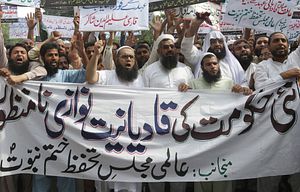On Friday, the Pakistan Tehreek-e-Insaf (PTI) government asked economist Atif R. Mian to step down from the Economic Advisory Council (EAC) owing to a backlash over his Ahmadiyya faith.
The objection was raised by radical Islamist groups like the Tehreek-i-Labbaik Pakistan (TLP) and opposition parties led by the Pakistan Muslim League-Nawaz (PML-N), which submitted a notice in the Senate against the appointment of Mian to the 18-member EAC that is to advise the government on economic policy.
But after a week of resistance, which echoed with refusal to “bow down to extremists,” that is precisely what the new government in Pakistan eventually did.
Of course, the widespread hate and antagonism against the Ahmadiyya Muslim community in Pakistan is nothing new. It became state sanctioned in 1974 when the Second Amendment to the Pakistani Constitution officially excommunicated the Ahmadiyya sect.
This barefaced religious persecution evolved into full-blown apartheid against the community through the Ordinance XX of the Pakistan Penal Code, which criminalized Ahmadis “posing as Muslims.” The extent of this apartheid can be seen in banners and posters across the country forbidding the entrance of Ahmadis.
Violence against the Ahmadis has gone on for decades as well, with an annually released report by the community underlining the instances of mob attacks, targeted killings, and desecration of Ahmadiyya mosques. On August 24, an Ahmadiyya mosque was torched in Faisalabad’s Ghaseet Pura area.
Even so, despite a long history of persecution of Ahmadi Muslims in Pakistan, the PTI-led government has managed to find a new way of doing so. The party that rose through its narrative of change and the touted goal of creating Naya (new) Pakistan has exhibited anti-Ahmadiyya bigotry like never before: immediately after having claimed to stand up to it.
It is self-evident that Imran Khan and his cabinet ministers were fully aware of what they had signed up for when they decided to include Atif Mian in the EAC. In 2014, Khan had announced his intention to make Mian his finance minister once he formed a government only to back out after finding out about his faith.
Therefore, presumably once Khan decided to take Mian on board, he was ready to face the heat and slug it out. This was also evident by the statements of the Information Minister Fawad Chaudhry, who vowed to unflinchingly safeguard minority rights and dubbed those questioning Mian’s appointment “extremists.”
But it turned out to be rhetoric of the most dangerous kind, given that the government capitulated without even being threatened by a radical Islamist mob.
Unlike the past, this surrender is particularly damning. In immediately contradicting its position on separating merit from religion and securing minority rights, the government has now established, quite clearly, that it would be doing none of what it had vowed.
And so, while overlooking Atif Mian from the get go – until at least sufficient groundwork for religious tolerance had been laid – would have meant failure to challenge the bigoted status quo, backtracking after his appointment reinforces that bigotry against the minorities at a time when Ahmadis are being killed and their mosques are been set afire.
Doing so while shamelessly chanting the mantra of “change” only means that any difference in position on Islamist extremism is for the worse. And even more ominously, in choosing to throw religious minorities under the bus, the PTI government has reaffirmed its overconfidence in its own abilities, with no reason to suggest that it won’t penetrate outside the realm of Islamism into other domains.
Even so, to limit the episode to the protection of minorities wouldn’t cover the core problem, which focuses entirely on the Ahmadiyya question.
This issue is unique in that it doesn’t concern the status of those communities that identify with a religion other than Islam. It hinges on the rights of those who self-identify as Muslims, which are curbed through the ideology of takfir on which every single Islamist terror group is founded.
In denying them that basic human right, which paradoxically the Constitution of Pakistan upholds, the state has paved the way for the Ahmadiyya community’s pursuance of their own beliefs and rituals being dubbed blasphemous in a country where that particular victimless thought crime is punishable by death.
That is why high court judges can call for the entire Ahmadiyya community’s termination, or the Council of Islamic Ideology can incite genocide as well with impunity.
The Ahmadiyya question will remain the litmus test for Pakistan’s democratic credentials, upholding of basic human rights, and freedom of religion. And Pakistan will remain an undemocratic, fascist, apartheid state till the day Ahmadis are given the right to self-identify as Muslims.
Until that day, Dr. Abdus Salam and Atif Mian will be disowned by the country while the rest of the world celebrates Pakistan’s finest minds.

































